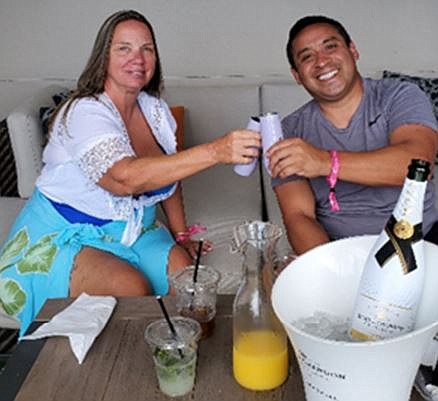TEXARKANA, Texas - A man and woman accused of filing hundreds of fraudulent loan applications for funds meant to help small businesses during the pandemic pleaded not guilty Wednesday in a Texarkana federal court.
Clifton Pape, 45, and Sally Jung, 58, both of Cleveland, Texas, appeared via video for arraignment hearings Wednesday in the Texarkana Division of the Eastern District of Texas. Jung appeared before U.S. Magistrate Judge Caroline Craven with Longview, Texas, lawyer Jason Cassel. Pape appeared with Texarkana lawyer Jeff Harrelson.
Craven scheduled both cases for jury selection April 26 before U.S. District Judge Robert Schroeder III.
Jung and Pape allegedly operated their scheme through a business called My Buddy Loans, according to a criminal complaint and a nine-count indictment.
The indictment accuses Pape and Jung of conspiracy to commit telemarketing wire fraud victimizing 10 or more persons over the age of 55 in its first count. The indictment also includes four counts of wire fraud and four counts of aggravated identity theft and aiding and abetting.
The indictment estimates its loss at $1.3 million or more and the illicit proceeds obtained by Pape and Jung at more than $700,000.
"We believe this investigation - to date - involves the single largest number of individual fraudulent EIDL (Economic Injury Disaster Loan) applications associated with the CARES Act," Acting U.S. Attorney Nicholas Ganjei said in a press statement issued at the time of the indictment in February.
In exchange for a sizable fee, Pape's and Jung's alleged telemarketing scheme involved using personal information from victims who believed they were applying for an agricultural grant. Instead of filing grant applications, Pape and Jung allegedly filed fraudulent EIDL applications with the Small Business Administration using the victims' personal data.
EIDL funds authorized under the coronavirus relief package were meant to help small businesses with employees.
Pape and Jung allegedly used Square's debit card processing service to charge victims a $1,000 fee at least 700 times. While the government has seized a bank account containing more than $500,000, which allegedly contains some of the allegedly money, not all funds have been recovered.
According to the complaint, Pape and Jung used more than $3,600 to pay for a stay at a resort in San Antonio, Texas. The criminal complaint includes a photo of the two defendants allegedly celebrating over drinks at the resort.
If convicted, Pape and Jung face the possibility of lengthy federal prison sentences and hefty financial penalties.
Count one, the conspiracy charge, is punishable by up to 30 years and a fine "not to exceed the greatest of $1 million, twice the gross gain, and twice the gross loss." If the conspiracy is found to involve telemarketing or email marketing, the defendants could face an additional term of five years and if the offense involves the victimization of 10 or more people over 55, then an additional term up to 10 years is possible.
That means the maximum punishment for count one is 45 years.
Counts two through five allege wire fraud. Each of those counts is punishable by up to 30 years and the same fine as in count one.
Counts six through nine allege aggravated identity theft and aiding and abetting. Each is punishable by up to two years and any sentence is to run consecutively to any other sentence imposed. A fine up to $250,000 is possible on each of the identity theft charges as well.

